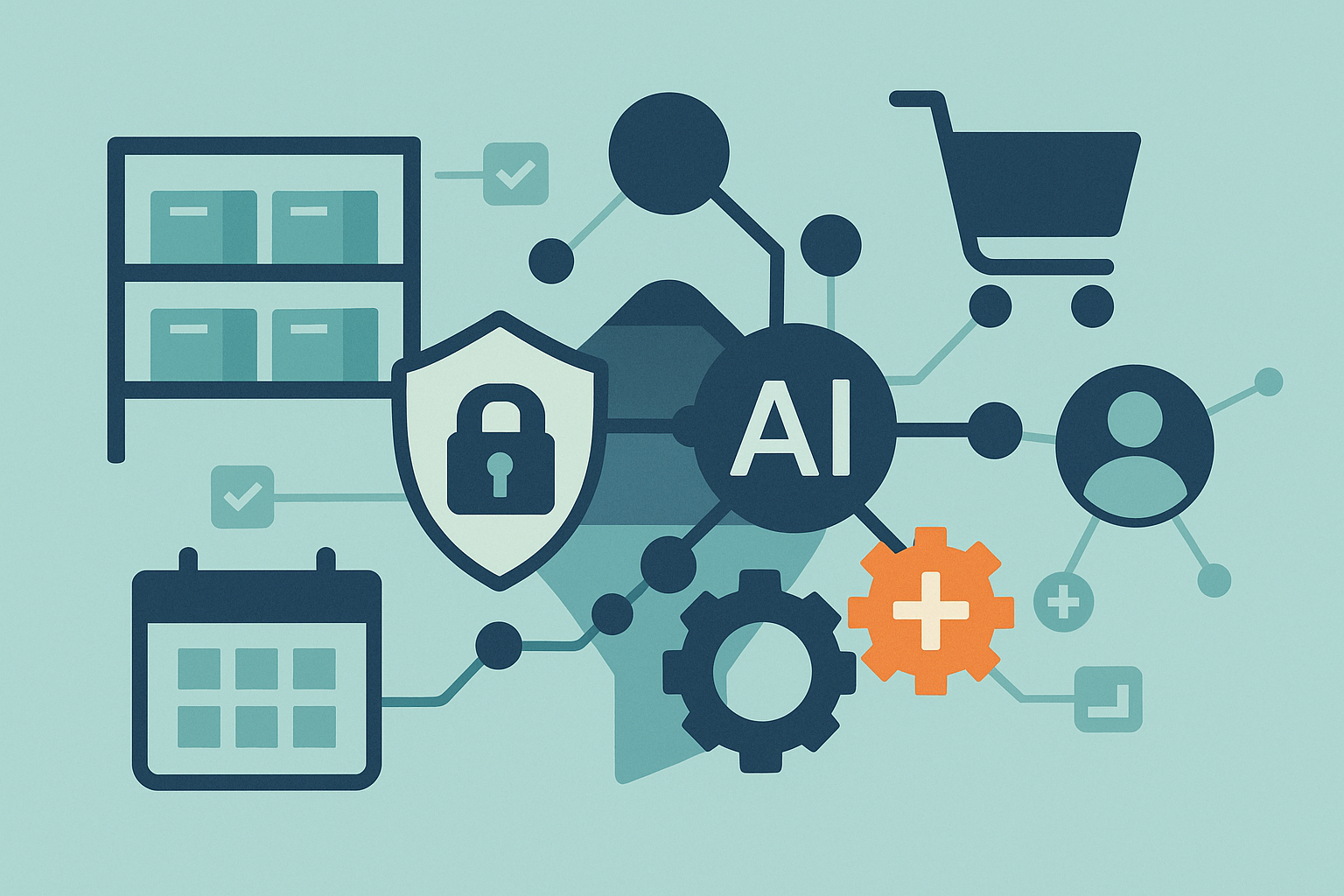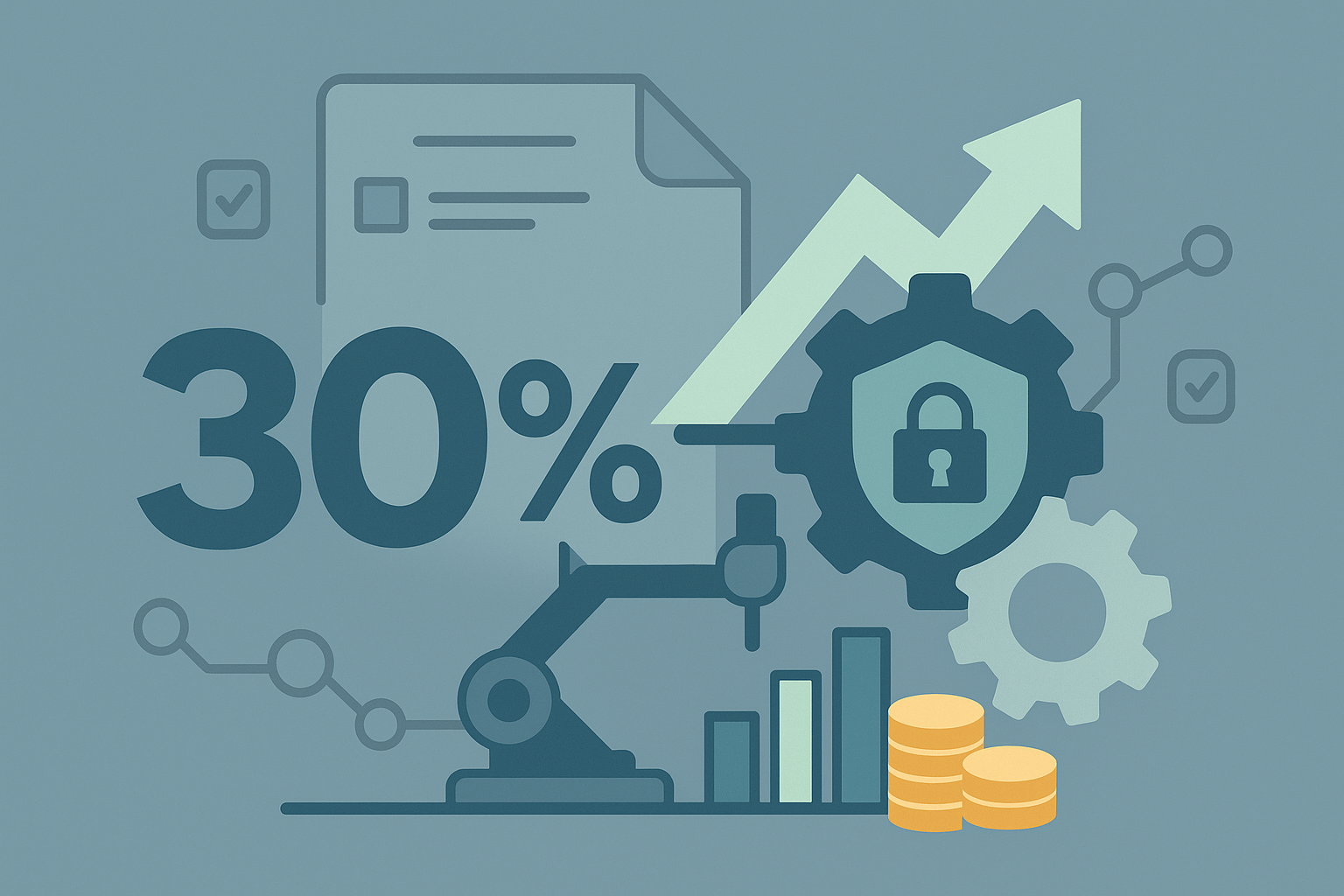AI-Driven E-Commerce: Lagerverwaltung, Personalisierung & Upselling
Revolutionieren Sie Ihr E-Commerce mit KI: Intelligente Lagerverwaltung, personalisierte Kundenerlebnisse und automatisiertes Upselling für maximalen Erfolg.

AI-Driven E-Commerce: Lagerverwaltung, Personalisierung & Upselling
E-Commerce-Unternehmen stehen vor einer beispiellosen Herausforderung: Während die Kundenerwartungen steigen, intensiviert sich der Wettbewerb. Künstliche Intelligenz bietet die Lösung durch intelligente Lagerverwaltung, hyperpersonalisierte Kundenerlebnisse und automatisiertes Upselling. Dieser umfassende Guide zeigt, wie Sie KI strategisch einsetzen, um Ihren Online-Handel zu revolutionieren.
Die KI-Revolution im E-Commerce
Aktuelle Marktdynamik
Zahlen, die den Wandel belegen:
- 85% der E-Commerce-Führungskräfte investieren bereits in KI-Technologien
- Conversion-Steigerung um 30% durch personalisierte Produktempfehlungen
- Kosteneinsparung von 25% bei intelligenter Lagerverwaltung
- ROI von 300%+ bei strategischer KI-Implementierung
Deutsche E-Commerce-Besonderheiten
Der deutsche Online-Handel bringt spezielle Anforderungen mit sich:
- DSGVO-konforme Datenverarbeitung ist Pflicht
- Höchste Qualitätsansprüche bei Produkten und Service
- Traditionell vorsichtige Kunden benötigen Vertrauen
- Lokale Marktführer dominieren viele Segmente
Erfahren Sie mehr über DSGVO-konforme Marketing-Automatisierung für rechtssichere KI-Implementierung.
Intelligente Lagerverwaltung mit KI
1. Predictive Inventory Management
KI-gestützte Bestandsvorhersage:
// Intelligentes Inventory Management System
class AIInventoryManager {
constructor(inventoryData, salesHistory) {
this.inventoryData = inventoryData;
this.salesHistory = salesHistory;
this.predictiveModel = new InventoryPredictionAI();
this.optimization = new InventoryOptimizationAI();
}
async optimizeInventory() {
const forecast = await this.generateDemandForecast();
const optimization = await this.calculateOptimalLevels(forecast);
const actionPlan = await this.createReplenishmentPlan(optimization);
return {
current_analysis: await this.analyzeCurrentState(),
demand_forecast: forecast,
optimization_recommendations: optimization,
action_plan: actionPlan,
expected_improvements: await this.calculateImpact(optimization)
};
}
async generateDemandForecast() {
const forecastData = await this.predictiveModel.predict({
historical_sales: this.salesHistory,
seasonal_patterns: await this.getSeasonalData(),
market_trends: await this.getMarketTrends(),
external_factors: await this.getExternalFactors(),
product_lifecycle: await this.getProductLifecycleData(),
competitive_analysis: await this.getCompetitorData()
});
const products = {};
for (const product of this.inventoryData.products) {
const prediction = await this.predictiveModel.forecastProduct({
product_id: product.id,
historical_data: product.sales_history,
seasonality: forecastData.seasonal_patterns[product.category],
trend_influence: forecastData.market_trends[product.category],
external_factors: forecastData.external_factors,
lead_time: product.supplier_lead_time,
safety_stock_days: product.safety_stock_requirement
});
products[product.id] = {
product_name: product.name,
current_stock: product.current_quantity,
predicted_demand: {
next_7_days: prediction.short_term_demand,
next_30_days: prediction.medium_term_demand,
next_90_days: prediction.long_term_demand
},
confidence_interval: prediction.confidence_level,
risk_factors: prediction.risk_assessment,
seasonal_adjustment: prediction.seasonal_modifier,
trend_factor: prediction.trend_influence
};
}
return {
forecast_period: '90_days',
products: products,
overall_trends: forecastData.market_trends,
seasonal_insights: forecastData.seasonal_patterns,
external_influences: forecastData.external_factors,
forecast_accuracy: await this.calculateForecastAccuracy()
};
}
async calculateOptimalLevels(forecast) {
const optimizedProducts = {};
for (const [productId, forecastData] of Object.entries(forecast.products)) {
const optimization = await this.optimization.optimizeProduct({
product_id: productId,
demand_forecast: forecastData.predicted_demand,
current_stock: forecastData.current_stock,
lead_time: await this.getLeadTime(productId),
holding_costs: await this.getHoldingCosts(productId),
stockout_costs: await this.getStockoutCosts(productId),
order_costs: await this.getOrderCosts(productId),
supplier_constraints: await this.getSupplierConstraints(productId)
});
optimizedProducts[productId] = {
optimal_order_quantity: optimization.eoq_optimized,
reorder_point: optimization.reorder_level,
safety_stock_level: optimization.safety_stock,
max_stock_level: optimization.maximum_inventory,
order_frequency: optimization.order_schedule,
cost_savings_potential: optimization.cost_reduction,
service_level_improvement: optimization.service_level_gain,
recommended_actions: optimization.immediate_actions
};
}
return {
optimized_products: optimizedProducts,
total_cost_savings: this.calculateTotalSavings(optimizedProducts),
inventory_turnover_improvement: this.calculateTurnoverImprovement(optimizedProducts),
service_level_target: '99.5%',
implementation_priority: this.prioritizeImplementation(optimizedProducts)
};
}
async createReplenishmentPlan(optimization) {
const replenishmentActions = [];
for (const [productId, optimalLevels] of Object.entries(optimization.optimized_products)) {
const currentStock = await this.getCurrentStock(productId);
const leadTime = await this.getLeadTime(productId);
if (currentStock <= optimalLevels.reorder_point) {
const urgency = this.calculateUrgency(currentStock, optimalLevels, leadTime);
replenishmentActions.push({
product_id: productId,
action_type: urgency.level >= 8 ? 'emergency_order' : 'standard_order',
order_quantity: optimalLevels.optimal_order_quantity,
urgency_level: urgency.level,
expected_stockout_date: urgency.stockout_prediction,
recommended_order_date: urgency.order_date,
supplier_lead_time: leadTime,
cost_impact: await this.calculateOrderCost(productId, optimalLevels.optimal_order_quantity),
alternative_suppliers: await this.getAlternativeSuppliers(productId)
});
}
}
return {
immediate_actions: replenishmentActions.filter(action => action.urgency_level >= 7),
planned_orders: replenishmentActions.filter(action => action.urgency_level < 7),
budget_requirement: replenishmentActions.reduce((sum, action) => sum + action.cost_impact, 0),
timeline: this.createImplementationTimeline(replenishmentActions),
supplier_coordination: this.createSupplierPlan(replenishmentActions)
};
}
}
2. Automated Warehouse Operations
Intelligente Lagerautomatisierung:
// KI-gesteuerte Lageroperationen
class AIWarehouseManager {
constructor(warehouseLayout, roboticSystems) {
this.warehouseLayout = warehouseLayout;
this.roboticSystems = roboticSystems;
this.pathOptimization = new PathOptimizationAI();
this.taskScheduling = new TaskSchedulingAI();
}
async optimizeWarehouseOperations() {
const operations = {
picking_optimization: await this.optimizePicking(),
storage_optimization: await this.optimizeStorage(),
task_scheduling: await this.optimizeTaskScheduling(),
quality_control: await this.implementQualityControl(),
staff_coordination: await this.optimizeStaffAllocation()
};
return this.synthesizeOptimizations(operations);
}
async optimizePicking() {
const orders = await this.getPendingOrders();
const inventory = await this.getInventoryLocations();
const optimizedRoutes = await this.pathOptimization.calculateOptimalRoutes({
warehouse_layout: this.warehouseLayout,
inventory_locations: inventory,
pending_orders: orders,
picker_capacity: await this.getPickerCapacity(),
time_constraints: await this.getTimeWindows(),
batch_size_optimization: true
});
const pickingStrategy = {
batch_picking: optimizedRoutes.batched_orders,
zone_picking: optimizedRoutes.zone_assignments,
wave_picking: optimizedRoutes.wave_schedule,
path_optimization: optimizedRoutes.optimal_paths,
estimated_time_savings: optimizedRoutes.efficiency_gain,
productivity_improvement: optimizedRoutes.productivity_increase
};
return pickingStrategy;
}
async optimizeStorage() {
const productCharacteristics = await this.getProductCharacteristics();
const accessPatterns = await this.getAccessPatterns();
const storageOptimization = await this.pathOptimization.optimizeStorage({
product_data: productCharacteristics,
access_frequency: accessPatterns,
warehouse_zones: this.warehouseLayout.zones,
seasonal_patterns: await this.getSeasonalAccessPatterns(),
product_affinity: await this.getProductAffinity(),
storage_constraints: this.warehouseLayout.constraints
});
return {
abc_analysis: storageOptimization.abc_classification,
zone_assignments: storageOptimization.optimal_zones,
storage_density: storageOptimization.density_optimization,
access_efficiency: storageOptimization.access_improvement,
space_utilization: storageOptimization.space_efficiency,
relocation_plan: storageOptimization.relocation_strategy
};
}
}
3. Supply Chain Intelligence
Lieferkettenoptimierung:
Supply Chain KI-Anwendungen:
Lieferantenmanagement:
Performance-Monitoring:
- Lieferzeitgenauigkeit: Echtzeit-Tracking
- Qualitätskennzahlen: Automatische Bewertung
- Preisvolatilität: Marktanalyse
- Risikobewertung: Kontinuierliche Überwachung
Automatisierte Beschaffung:
- Bestellauslösung: Regelbasiert + KI-Vorhersage
- Lieferantenauswahl: Multi-Kriterien-Optimierung
- Preisverhandlung: KI-gestützte Strategien
- Vertragsmanagement: Automatische Verlängerungen
Logistikoptimierung:
Routenplanung:
- Echtzeitverkehr: GPS + Verkehrsdaten
- Wettereinflüsse: Meteorologie-Integration
- Fahrzeugauslastung: Kapazitätsoptimierung
- CO2-Optimierung: Nachhaltigkeitsintegration
Liefervorhersage:
- Kundenkommunikation: Proaktive Updates
- Zeitfenster-Optimierung: Kundenpräferenzen
- Exception-Management: Automatische Problemlösung
- Last-Mile-Optimierung: Lokale Gegebenheiten
Hyperpersonalisierung im E-Commerce
1. Customer Journey Intelligence
KI-gestützte Kundenanalyse:
// Personalisierungs-Engine
class ECommercePersonalizationAI {
constructor(customerData, behaviorTracking) {
this.customerData = customerData;
this.behaviorTracking = behaviorTracking;
this.personalizationAI = new PersonalizationEngine();
this.recommendationAI = new RecommendationEngine();
}
async createPersonalizedExperience(customerId) {
const customerProfile = await this.buildComprehensiveProfile(customerId);
const personalizedExperience = {
homepage_personalization: await this.personalizeHomepage(customerProfile),
product_recommendations: await this.generateRecommendations(customerProfile),
content_personalization: await this.personalizeContent(customerProfile),
pricing_optimization: await this.optimizePricing(customerProfile),
communication_personalization: await this.personalizeCommunication(customerProfile)
};
return this.optimizeExperience(personalizedExperience, customerProfile);
}
async buildComprehensiveProfile(customerId) {
const customer = await this.customerData.getCustomer(customerId);
const behaviorData = await this.behaviorTracking.getCustomerBehavior(customerId);
const profile = await this.personalizationAI.analyzeCustomer({
demographics: customer.demographics,
purchase_history: customer.orders,
browsing_behavior: behaviorData.browsing_patterns,
interaction_history: behaviorData.interactions,
communication_preferences: customer.preferences,
device_usage: behaviorData.device_patterns,
seasonal_behavior: behaviorData.seasonal_trends,
price_sensitivity: await this.analyzePriceSensitivity(customer),
brand_affinity: await this.analyzeBrandAffinity(customer),
category_preferences: await this.analyzeCategoryPreferences(customer)
});
const customerSegment = await this.personalizationAI.segmentCustomer({
profile_data: profile,
behavioral_patterns: behaviorData,
value_metrics: await this.calculateCustomerValue(customerId),
lifecycle_stage: await this.determineLifecycleStage(customerId),
churn_probability: await this.calculateChurnRisk(customerId)
});
return {
customer_id: customerId,
profile: profile,
segment: customerSegment,
preferences: {
communication_channels: profile.preferred_channels,
content_types: profile.content_preferences,
product_categories: profile.category_interests,
price_range: profile.price_sensitivity,
brand_preferences: profile.brand_affinity
},
behavioral_triggers: {
purchase_triggers: profile.purchase_motivators,
browsing_patterns: profile.navigation_preferences,
time_patterns: profile.active_periods,
device_preferences: profile.device_usage
},
personalization_opportunities: await this.identifyOpportunities(profile, customerSegment)
};
}
async generateRecommendations(customerProfile) {
const recommendations = await this.recommendationAI.generate({
customer_profile: customerProfile,
recommendation_types: [
'product_recommendations',
'category_suggestions',
'brand_recommendations',
'accessory_suggestions',
'replacement_reminders',
'seasonal_recommendations'
],
context: {
current_session: await this.getCurrentSessionData(customerProfile.customer_id),
cart_contents: await this.getCartContents(customerProfile.customer_id),
recent_views: await this.getRecentViews(customerProfile.customer_id),
wishlist_items: await this.getWishlistItems(customerProfile.customer_id)
},
business_objectives: {
revenue_optimization: true,
margin_optimization: true,
inventory_turnover: true,
cross_sell_opportunities: true,
customer_satisfaction: true
}
});
const optimizedRecommendations = {
primary_recommendations: recommendations.high_confidence_products,
alternative_options: recommendations.medium_confidence_products,
discovery_items: recommendations.exploration_products,
complementary_products: recommendations.cross_sell_items,
upgrade_opportunities: recommendations.upsell_products,
seasonal_suggestions: recommendations.seasonal_items,
recommendation_strategies: {
collaborative_filtering: recommendations.similar_customers_bought,
content_based: recommendations.similar_products,
hybrid_approach: recommendations.combined_recommendations,
trending_items: recommendations.popularity_based,
personal_trends: recommendations.individual_patterns
},
optimization_metrics: {
expected_ctr: recommendations.click_through_prediction,
conversion_probability: recommendations.purchase_probability,
average_order_value_impact: recommendations.aov_increase,
customer_satisfaction_score: recommendations.satisfaction_prediction
}
};
return optimizedRecommendations;
}
}
2. Dynamic Content Personalization
Intelligente Content-Anpassung:
// Content-Personalisierung System
class ContentPersonalizationEngine {
constructor(contentLibrary, customerProfiles) {
this.contentLibrary = contentLibrary;
this.customerProfiles = customerProfiles;
this.contentAI = new ContentOptimizationAI();
}
async personalizeContent(customerId, pageContext) {
const customerProfile = await this.customerProfiles.getProfile(customerId);
const contentStrategy = await this.contentAI.optimizeContent({
customer_segment: customerProfile.segment,
behavioral_data: customerProfile.behavior,
page_context: pageContext,
business_goals: await this.getBusinessGoals(),
content_inventory: this.contentLibrary.getAllContent()
});
return {
hero_section: await this.personalizeHeroSection(customerProfile, contentStrategy),
product_displays: await this.personalizeProductDisplays(customerProfile, contentStrategy),
messaging: await this.personalizeMessaging(customerProfile, contentStrategy),
call_to_actions: await this.personalizeCTAs(customerProfile, contentStrategy),
navigation: await this.personalizeNavigation(customerProfile, contentStrategy)
};
}
async personalizeHeroSection(customerProfile, contentStrategy) {
const heroOptions = await this.contentLibrary.getHeroSections();
const selectedHero = await this.contentAI.selectOptimalContent({
content_options: heroOptions,
customer_segment: customerProfile.segment,
optimization_goal: contentStrategy.primary_objective,
personalization_factors: {
seasonal_relevance: contentStrategy.seasonal_factor,
category_interest: customerProfile.preferences.categories,
price_sensitivity: customerProfile.price_sensitivity,
brand_affinity: customerProfile.brand_preferences,
device_context: customerProfile.current_device
}
});
return {
background_image: selectedHero.image,
headline: this.personalizeHeadline(selectedHero.headline, customerProfile),
subheadline: this.personalizeSubheadline(selectedHero.subheadline, customerProfile),
cta_button: this.personalizeCTA(selectedHero.cta, customerProfile),
featured_products: await this.selectFeaturedProducts(customerProfile)
};
}
}
3. Real-time Behavioral Targeting
Verhaltensbasierte Personalisierung:
Real-time Personalisierung:
Behavioral Triggers:
Scroll-Depth-Tracking:
- Interesse-Level: Scroll-Geschwindigkeit
- Content-Engagement: Verweildauer
- Exit-Intent: Mausbewegungen
- Conversion-Wahrscheinlichkeit: Engagement-Score
Micro-Interactions:
- Hover-Verhalten: Produkt-Interesse
- Click-Patterns: Navigation-Präferenzen
- Search-Behavior: Intent-Analyse
- Cart-Interactions: Kaufbereitschaft
Dynamic Adjustments:
Content-Anpassung:
- Messaging: Echtzeit-Optimierung
- Produktdarstellung: Präferenz-basiert
- Preisdarstellung: Sensitivitäts-angepasst
- Social Proof: Segment-relevant
User Interface:
- Layout-Anpassung: Device-optimiert
- Navigation: Behavior-optimiert
- Search-Experience: Intent-fokussiert
- Checkout-Flow: Friction-reduziert
Intelligentes Upselling und Cross-Selling
1. AI-Powered Recommendation Engine
Erweiterte Verkaufsstrategien:
// Upselling & Cross-Selling KI-Engine
class IntelligentSalesEngine {
constructor(productCatalog, customerData, salesHistory) {
this.productCatalog = productCatalog;
this.customerData = customerData;
this.salesHistory = salesHistory;
this.salesAI = new SalesOptimizationAI();
this.pricingAI = new DynamicPricingAI();
}
async optimizeSalesOpportunities(customerId, currentCart) {
const customer = await this.customerData.getCustomer(customerId);
const salesStrategy = await this.salesAI.generateStrategy({
customer_profile: customer,
current_cart: currentCart,
product_catalog: this.productCatalog,
sales_history: this.salesHistory,
market_conditions: await this.getMarketConditions(),
inventory_levels: await this.getInventoryStatus(),
margin_targets: await this.getMarginTargets()
});
return {
upselling_opportunities: await this.generateUpsellingOffers(salesStrategy),
cross_selling_opportunities: await this.generateCrossSellingOffers(salesStrategy),
bundle_recommendations: await this.generateBundleOffers(salesStrategy),
timing_optimization: await this.optimizeTiming(salesStrategy),
pricing_strategy: await this.optimizePricing(salesStrategy),
success_probability: await this.calculateSuccessProbability(salesStrategy)
};
}
async generateUpsellingOffers(salesStrategy) {
const upsellingOffers = [];
for (const cartItem of salesStrategy.current_cart.items) {
const upgradeOptions = await this.salesAI.findUpgradeOptions({
current_product: cartItem,
customer_segment: salesStrategy.customer_profile.segment,
price_sensitivity: salesStrategy.customer_profile.price_sensitivity,
feature_preferences: salesStrategy.customer_profile.feature_preferences,
usage_patterns: salesStrategy.customer_profile.usage_data
});
for (const upgrade of upgradeOptions) {
const offer = await this.createUpsellingOffer({
original_product: cartItem,
upgrade_product: upgrade,
customer_profile: salesStrategy.customer_profile,
value_proposition: await this.calculateValueProposition(cartItem, upgrade),
pricing_strategy: await this.optimizeUpsellingPrice(cartItem, upgrade),
success_probability: await this.calculateUpsellingProbability(cartItem, upgrade, salesStrategy.customer_profile)
});
if (offer.success_probability > 0.3) { // 30% Mindest-Erfolgswahrscheinlichkeit
upsellingOffers.push(offer);
}
}
}
return upsellingOffers.sort((a, b) =>
(b.success_probability * b.revenue_impact) - (a.success_probability * a.revenue_impact)
);
}
async generateCrossSellingOffers(salesStrategy) {
const crossSellingOffers = [];
const cartProducts = salesStrategy.current_cart.items.map(item => item.product_id);
const complementaryProducts = await this.salesAI.findComplementaryProducts({
cart_products: cartProducts,
customer_preferences: salesStrategy.customer_profile.preferences,
purchase_history: salesStrategy.customer_profile.purchase_history,
market_basket_analysis: await this.getMarketBasketAnalysis(),
seasonal_factors: await this.getSeasonalFactors(),
inventory_priorities: await this.getInventoryPriorities()
});
for (const complement of complementaryProducts) {
const crossSellOffer = await this.createCrossSellingOffer({
primary_products: cartProducts,
complement_product: complement,
customer_profile: salesStrategy.customer_profile,
relationship_strength: complement.affinity_score,
value_proposition: await this.calculateCrossSellValue(cartProducts, complement),
bundling_opportunity: await this.evaluateBundlingPotential(cartProducts, complement),
success_probability: await this.calculateCrossSellProbability(complement, salesStrategy.customer_profile)
});
if (crossSellOffer.success_probability > 0.25) { // 25% Mindest-Erfolgswahrscheinlichkeit
crossSellingOffers.push(crossSellOffer);
}
}
return crossSellingOffers.sort((a, b) =>
(b.success_probability * b.revenue_impact) - (a.success_probability * a.revenue_impact)
);
}
async generateBundleOffers(salesStrategy) {
const bundleOpportunities = await this.salesAI.identifyBundleOpportunities({
current_cart: salesStrategy.current_cart,
customer_segment: salesStrategy.customer_profile.segment,
product_affinities: await this.getProductAffinities(),
margin_optimization: true,
inventory_considerations: await this.getInventoryConsiderations()
});
const optimizedBundles = [];
for (const bundle of bundleOpportunities) {
const bundleOffer = await this.optimizeBundleOffer({
bundle_products: bundle.products,
discount_strategy: await this.calculateOptimalDiscount(bundle),
value_messaging: await this.createValueMessaging(bundle),
customer_profile: salesStrategy.customer_profile,
competitive_analysis: await this.getCompetitiveBundleAnalysis(bundle),
success_probability: await this.calculateBundleProbability(bundle, salesStrategy.customer_profile)
});
optimizedBundles.push(bundleOffer);
}
return optimizedBundles.filter(bundle => bundle.success_probability > 0.2)
.sort((a, b) => b.expected_value - a.expected_value);
}
}
2. Dynamic Pricing Intelligence
Intelligente Preisoptimierung:
// Dynamic Pricing für E-Commerce
class DynamicPricingEngine {
constructor(marketData, competitorData, customerSegments) {
this.marketData = marketData;
this.competitorData = competitorData;
this.customerSegments = customerSegments;
this.pricingAI = new PricingOptimizationAI();
}
async optimizeProductPricing(productId, customerSegment, context) {
const pricingFactors = await this.analyzePricingFactors(productId, customerSegment, context);
const optimalPrice = await this.pricingAI.calculateOptimalPrice({
base_price: pricingFactors.base_price,
demand_elasticity: pricingFactors.elasticity,
competitor_prices: pricingFactors.competitive_landscape,
customer_sensitivity: pricingFactors.price_sensitivity,
inventory_level: pricingFactors.stock_status,
margin_targets: pricingFactors.profit_goals,
market_conditions: pricingFactors.market_state
});
return {
recommended_price: optimalPrice.price,
price_adjustment: optimalPrice.adjustment_percentage,
confidence_level: optimalPrice.confidence,
expected_impact: {
revenue_change: optimalPrice.revenue_impact,
margin_change: optimalPrice.margin_impact,
volume_change: optimalPrice.volume_impact,
market_share_impact: optimalPrice.market_impact
},
personalization_factors: {
customer_lifetime_value: optimalPrice.clv_consideration,
loyalty_tier_discount: optimalPrice.loyalty_adjustment,
behavioral_pricing: optimalPrice.behavior_based_adjustment,
urgency_pricing: optimalPrice.urgency_factor
}
};
}
}
3. Conversion Optimization
Checkout-Optimierung:
Conversion-Optimierung:
Checkout-Intelligence:
Friction-Reduktion:
- Ein-Klick-Checkout: Wiederkehrende Kunden
- Gast-Checkout: Neue Kunden
- Auto-Fill: Adress- und Zahlungsdaten
- Progress-Indicator: Transparenz schaffen
Payment-Optimierung:
- Multiple Zahlungsarten: Präferenz-basiert
- BNPL-Integration: Buy Now, Pay Later
- Digital Wallets: Apple Pay, Google Pay
- Installment-Optionen: Hochpreisige Produkte
Abandonment-Recovery:
Real-time Intervention:
- Exit-Intent-Popups: Last-Chance-Angebote
- Cart-Reminders: Zeitgesteuerte E-Mails
- Progressive Discounts: Stufenweise Anreize
- Social Proof: Live Käufer-Aktivität
Follow-up Strategien:
- Retargeting Ads: Personalisiert
- E-Mail-Serien: Mehrstufig
- SMS-Reminders: Zeitkritisch
- Push-Notifications: App-User
Praktische Implementierung
ROI-Kalkulation für KI-E-Commerce
Business Case Entwicklung:
// ROI Calculator für KI-E-Commerce Implementierung
class ECommerceAIROICalculator {
constructor(baselineMetrics, implementationCosts) {
this.baseline = baselineMetrics;
this.costs = implementationCosts;
}
calculateROI(timeframe = 12) {
const benefits = {
inventory_optimization: this.calculateInventoryBenefits(),
personalization_gains: this.calculatePersonalizationBenefits(),
upselling_revenue: this.calculateUpsellBenefits(),
operational_efficiency: this.calculateEfficiencyBenefits(),
customer_retention: this.calculateRetentionBenefits()
};
const costs = {
ai_platform_licenses: this.costs.ai_tools * timeframe,
implementation_services: this.costs.consulting_fees,
integration_costs: this.costs.technical_implementation,
training_costs: this.costs.staff_training,
ongoing_maintenance: this.costs.monthly_maintenance * timeframe
};
const roi = {
total_benefits: Object.values(benefits).reduce((sum, benefit) => sum + benefit, 0),
total_costs: Object.values(costs).reduce((sum, cost) => sum + cost, 0),
net_benefit: 0,
roi_percentage: 0,
payback_months: 0
};
roi.net_benefit = roi.total_benefits - roi.total_costs;
roi.roi_percentage = (roi.net_benefit / roi.total_costs) * 100;
roi.payback_months = roi.total_costs / (roi.total_benefits / timeframe);
return {
...roi,
benefit_breakdown: benefits,
cost_breakdown: costs,
monthly_impact: roi.net_benefit / timeframe
};
}
calculateInventoryBenefits() {
const currentInventoryValue = this.baseline.average_inventory_value;
const carryingCostRate = 0.25; // 25% jährliche Lagerkosten
const reductions = {
excess_inventory: currentInventoryValue * 0.15, // 15% Überbestand-Reduktion
stockout_reduction: this.baseline.monthly_revenue * 0.03 * 12, // 3% weniger Verluste
ordering_efficiency: this.baseline.annual_ordering_costs * 0.30 // 30% Kosteneinsparung
};
return Object.values(reductions).reduce((sum, reduction) => sum + reduction, 0);
}
calculatePersonalizationBenefits() {
const conversionImprovement = 0.25; // 25% Conversion-Steigerung
const aovImprovement = 0.18; // 18% AOV-Steigerung
return (this.baseline.monthly_revenue * 12) *
(conversionImprovement + aovImprovement);
}
calculateUpsellBenefits() {
const upsellRate = 0.15; // 15% Upselling-Rate
const averageUpsellValue = this.baseline.average_order_value * 0.40;
const monthlyOrders = this.baseline.monthly_orders;
return monthlyOrders * 12 * upsellRate * averageUpsellValue;
}
}
Implementierungsroadmap
Schritt-für-Schritt Umsetzung:
Phase 1 - Foundation (Monate 1-3):
Datengrundlagen:
- Customer Data Platform: Zentrale Datenhaltung
- Analytics Integration: Tracking & Measurement
- Data Cleansing: Datenqualität sicherstellen
- DSGVO Compliance: Rechtssichere Umsetzung
Quick Wins:
- Basis-Personalisierung: Homepage & Kategorien
- Einfache Produktempfehlungen: "Ähnliche Produkte"
- Cart Abandonment: E-Mail-Recovery
- Inventory Alerts: Bestandsüberwachung
Phase 2 - Intelligence (Monate 4-6):
Advanced Analytics:
- Predictive Inventory: Bedarfsvorhersage
- Customer Segmentation: KI-basierte Gruppen
- Behavioral Targeting: Real-time Anpassung
- Dynamic Pricing: Erste Preisoptimierung
Personalization Engine:
- ML-Recommendations: Collaborative Filtering
- Content Personalization: Individual angepasst
- Cross-Sell Intelligence: Intelligente Vorschläge
- Email Personalization: Segment-spezifisch
Phase 3 - Optimization (Monate 7-12):
Advanced AI:
- Deep Learning Models: Erweiterte Vorhersagen
- Real-time Personalization: Sofort-Anpassung
- Advanced Upselling: Intelligente Strategien
- Supply Chain AI: End-to-End Optimierung
Business Intelligence:
- Performance Analytics: ROI-Tracking
- Customer Journey: Vollständige Analyse
- Competitive Intelligence: Marktpositionierung
- Predictive Customer Value: CLV-Optimierung
Key Takeaways: KI-E-Commerce meistern
Die wichtigsten Erkenntnisse für KI-getriebenen Online-Handel:
- 85% der E-Commerce-Leader investieren bereits in KI - der Wettbewerbsvorteil liegt in der strategischen Umsetzung
- Conversion-Steigerung von 30% durch personalisierte Produktempfehlungen realistisch
- Inventory-Kostenersparnis von 25% durch predictive Analytics erreichbar
- ROI von 300%+ bei ganzheitlicher KI-Implementation nach 12 Monaten
- DSGVO-Compliance ist kritisch für deutsche E-Commerce-Unternehmen
- Schrittweise Implementierung reduziert Risiken und maximiert Erfolgswahrscheinlichkeit
Häufig gestellte Fragen (FAQ)
Q: Wie lange dauert die Implementierung einer KI-E-Commerce-Lösung? A: Eine vollständige KI-Integration benötigt typischerweise 6-12 Monate. Quick Wins wie Basis-Personalisierung sind bereits nach 4-6 Wochen möglich. Die schrittweise Implementierung minimiert Risiken und zeigt frühe Erfolge.
Q: Welche Investition ist für KI-E-Commerce realistisch? A: Mittelständische Online-Händler sollten mit €15.000-50.000 Erstinvestition rechnen, plus €3.000-8.000 monatliche Betriebskosten. Der ROI liegt bei 200-400% nach 12 Monaten. Berechnen Sie Ihr Potenzial mit unserem Kalkulator.
Q: Kann KI auch bei kleinen Produktkatalogen sinnvoll sein? A: Ja! Bereits ab 100 Produkten bringt KI messbare Vorteile durch bessere Personalisierung und Kundenanalyse. Wichtiger als die Katalogröße sind Datenqualität und Implementierungsstrategie.
Q: Wie stelle ich DSGVO-Konformität bei KI-Personalisierung sicher? A: Durch Privacy-by-Design: Explizite Einwilligung für Datennutzung, Transparenz über KI-Verfahren, Löschrechte implementieren und EU-Server verwenden. Mehr zu DSGVO-Marketing.
Q: Welche KI-Tools eignen sich für E-Commerce-Einsteiger? A: Shopify Plus (E-Commerce-native KI), Dynamic Yield (Personalisierung), Yotpo (Reviews & UGC), Klaviyo (E-Mail-KI) und Google Analytics Intelligence. Starten Sie mit einem Tool und erweitern Sie schrittweise.
Q: Wie messe ich den Erfolg meiner KI-E-Commerce-Strategie? A: Key Metriken: Conversion Rate (+20-30%), Average Order Value (+15-25%), Customer Lifetime Value (+30-40%), Inventory Turnover (+20%), Customer Satisfaction (NPS +15-20 Punkte). Monatliches Dashboard-Monitoring ist essentiell.
Bereit für KI-getriebenen E-Commerce-Erfolg? Unsere E-Commerce-KI-Experten entwickeln maßgeschneiderte Lösungen für maximale Online-Performance. Buchen Sie eine kostenlose E-Commerce-KI-Beratung oder ermitteln Sie Ihr Umsatzpotenzial mit unserem ROI-Rechner.
Nächste Schritte:
- Kostenlose E-Commerce-KI-Strategie-Session buchen für Ihren Online-Shop
- ROI-Potenzial berechnen für KI-Implementierung
- Inventory Management automatisieren mit intelligenten Systemen
- Workshop für hands-on E-Commerce-KI-Implementation vereinbaren


